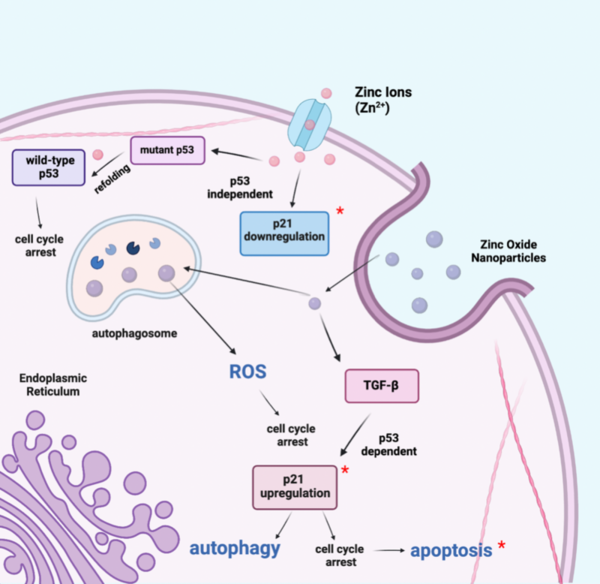Investigating the potential of zinc oxide nanoparticles and zinc ions as promising approaches to lung cancer
(1) Bergen County Academies
https://doi.org/10.59720/23-128
Lung cancer is the leading cause of cancer casualties globally, with adverse side effects and drug resistance making current therapeutic options inadequate. Therefore, novel therapeutics require development. A major genetic contributor to these cancers is the mutant TP53 gene, whose mutated protein fails to transactivate p21, a cell cycle control protein in p53-p21-RB signaling, resulting in uncontrolled cell growth and cisplatin resistance. Recent studies suggest zinc oxide nanoparticles (ZnO NPs) show promise as a targeted, cytotoxic therapy; however, their mechanisms and efficacy are strongly debated as they aggregate in solution, reducing bioavailability while demonstrating poor aqueous solubility. As such, we hypothesized that a combined treatment using either ZnO NPs and cisplatin or zinc ions and cisplatin would induce cancer cell apoptosis and reduce cisplatin resistance. We treated mutant p53 lung cancer cells with ZnO NPs, zinc ion solution isolated from the NP suspension, and/or cisplatin; all significantly reduced proliferation individually and in combination. Increased reactive oxygen species (ROS) and p21 upregulation from ZnO NP treatment suggests mechanisms involving p21, perhaps through a p53-independent mechanism or via p53 reactivation. Zinc ion solution rendered a reduction in p21 in the presence of significantly lower ROS induced by ZnO NP, suggesting a mechanism needing further elucidation. We subjected a control cell line, HaCaT cells, to the same treatments and demonstrated no significant reduction in proliferation in the presence of ZnO NPs or zinc ions. Our research suggests the use of ZnO NPs and zinc ions as potential strategies for lung cancer treatment regimens.
This article has been tagged with: